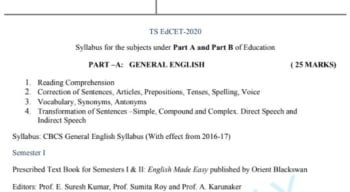TS Ed.CET Exam Syllabus PDF || Check Exam Pattern & Download Here!!! Osmania University, Hyderabad on behalf of Telangana State Council Of Higher Education is conducting the Telangana State Education Common Entrance Test (TS Ed. CET) for admission of B.Ed (2 Years) regular course in the colleges of education in Telangana. The aspirants who are preparing for the examination can download the subject-wise syllabus PDF in this blog. The exam pattern and exam details are mentioned in this blog.
TS Ed.CET Exam Syllabus PDF
| Board Name | Osmania University |
| Name Of The Exam | TS Ed.CET |
| Medium Of Exam | English, Telugu And Urdu |
| Notification Release Date | End Of March |
| Mode Of Application | Offline |
| Status | Syllabus |
Ts Ed.Cet Examination Syllabus:
Part A- General English:
- Reading Comprehension
- Correction Of Sentences
- Vocabulary
- Synonyms
- Antonyms
- Transformation Of Sentences
- Simple, Compound And Complex
- Direct Speech And Indirect Speech Etc…
Part-B General Knowledge And Teaching Aptitude:
- History
- Culture
- Geography
- Ecology
- Current Affairs
- Teaching Ability Etc…
Part C: Subject Wise Syllabus
Mathematics:
- Differential Calculus
- Differential Equations
- Real Analysis
- Algebra
- Linear Algebra
- Numerical Analysis
Physical Sciences:
Physics:
- Vector Analysis
- Mechanics Of Particles
- Mechanics Of Rigid Bodies
- Central Forces
- Special Theory Of Relativity
- Fundamentals Of Vibrations
- Damped And Forced Oscillations
- Vibrating Strings:
- Vibrations Of Bars
- Kinetic Theory Of Gases
- Thermodynamics
- Thermodynamic Potentials And Maxwell’s Equations
- Low Temperature Physics Quantum Theory Of Radiation Etc…
Chemistry:
- Atomic Structure And Elementary Quantum Mechanics
- Chemical Bonding
- S-Block Elements:
- P-Block Elements
- D-Block-Elements
- F-Block Elements
- Organic Chemistry
- Acyclic Hydrocarbons
- Carbohydrates
- Physical Chemistry
- Liquid State
- Colloids& Surface Chemistry
- General Chemistry
- Molecular Spectroscopy
- Electronic Spectroscopy Etc….
Biological Sciences:
Botany:
- Microbial Diversity Of Lower Plants
- Bryophytes, Pteridophytes And Gymnosperms
- Taxonomy Of Angiosperms And Medicinal Botany
- Plant Anatomy & Embryology
- Cell Biology And Genetics
- Plant Physiology
- Zoology:
- Animal Diversity – Invertebrates
- Ecology, Zoogeography And Animal Behavior
- Animal Diversity- Vertebrates And Developmental Biology
- Cell Biology, Genetics & Evolution
- Physiology And Biochemistry
- Physiology
- Immunology And Animal Biotechnology Immunology
- Aquatic Biomes
- Fresh Water Biology And Marine Biology
- Management Of Aquatic Resources
- Public Health And Hygiene
- Preventive Medicine
- Concept Of Health And Diseases
Social Studies:
Geography:
- Principles Of Physical Geography
- Social And Economic Geography
- Regional Geography Of India
- Remote Sensing And Geographic Information Systems (Gis)
- History:
- History Of India (From Earliest Times To C.700 Ce)
- History Of India (C.700-1526 Ce)
- History Of India (1526-1857 Ce)
- History Of India (1858-1964 Ce)
- World History (1453-1815 Ce)
- World History (1815-1950 Ce)
Civics:
- Political Science – Concepts And Theories:
- Indian Government And Politics:
- International Relations:
- Public Administration
- Public Administration – Concepts And Theories
- Public Administration In India
Economics:
- Definitions Of Economics, Micro And Macro Economics, Normative And Positive Economics, Static, Dynamic, Inductive And Deductive Approaches, Partial And General Equilibrium.
- Cardinal And Ordinal Utility Approaches
- Law Of Variable Proportions
- Cost Concepts; Cost-Output Relationship; Economies Of Scale
- Markets: Perfect Competition, Monopoly And Oligopoly (Kinky Demand)
- Factor Pricing: Marginal Productivity Theory, Ricardo’s Rent Theory And Loanable Funds Theory Of Interest Rate.
- Concepts Of National Income, Methods Of National Income And Business Cycles. Etc…
English Methodology
- History Of The English Language
- The Structure Of English Language
- Figures Of Speech
- Literary Movements
- Elements Of Literature
- English Poetry
- English Drama
- English Fiction
- Modern Indian Literature
- American Literature
Oriental Languages
Marathi Methodology:
- BA Optional Marathi Syllabus
- Literary Criticism
- Linguistic Study Of Marathi
- Grammar
- Modern Marathi Poetry Etc…
Hindi Methodology
- History Of The Hindi Literature And Language
- Hindi Bhasha Gyan Etc…
TS Ed.CET Examination Scheme:
The Common Entrance Test will be of objective type (multiple choice) examination. Candidate has to answer 150 questions in two hours time.
Part-A:
General English – 25 Questions for 25 Marks
Part-B:
1) General Knowledge –15 Questions for 15 Marks
2) Teaching Aptitude –10 Questions for 10 Marks
Part-C:
Methodology: Candidate has to choose one of the following subjects. It consists of 100 questions for 100 marks.
1) Mathematics –100 Questions for 100 Marks
2) Physical Sciences –100 Questions for 100 Marks
(I) Physics –50 Questions for 50 Marks
(II) Chemistry –50 Questions for 50 Marks
3) Biological Sciences –100 Questions for 100 Marks
(I) Botany –50 Questions for 50 Marks
(II) Zoology –50 Questions for 50 Marks
4) Social Studies –100 Questions for 100 Marks
(I) Geography –35 Questions for 35 Marks
(II) History –30 Questions for 30 Marks
(III) Civics –15 Questions for 15 Marks
(IV) Economics –20 Questions for 20 Marks
5) English
6) Oriental Languages
- Marathi -100 Questions for 100 Marks
- Telugu -100 Questions for 100 Marks
- Hindi -100 Questions for 100 Marks
- Urdu -100 Questions for 100 Marks
- Arabic -100 Questions for 100 Marks
- Sanskrit –100 Questions for 100 Marks
Note: Part-A and Part-B are common for all the candidates irrespective of methodology chosen in Part-C

Hello Friends, I am from India. After earning my Graduate degree in Computer Application, I decided to pursue my passion for Web Designing and Content Writing. My ultimate goal is to become one of the best in my field and continue to deliver high-quality content. Further, I aim to deliver the latest information regarding recruitment to job seekers, the latest news with accuracy, which shall benefit them in every way possible.

